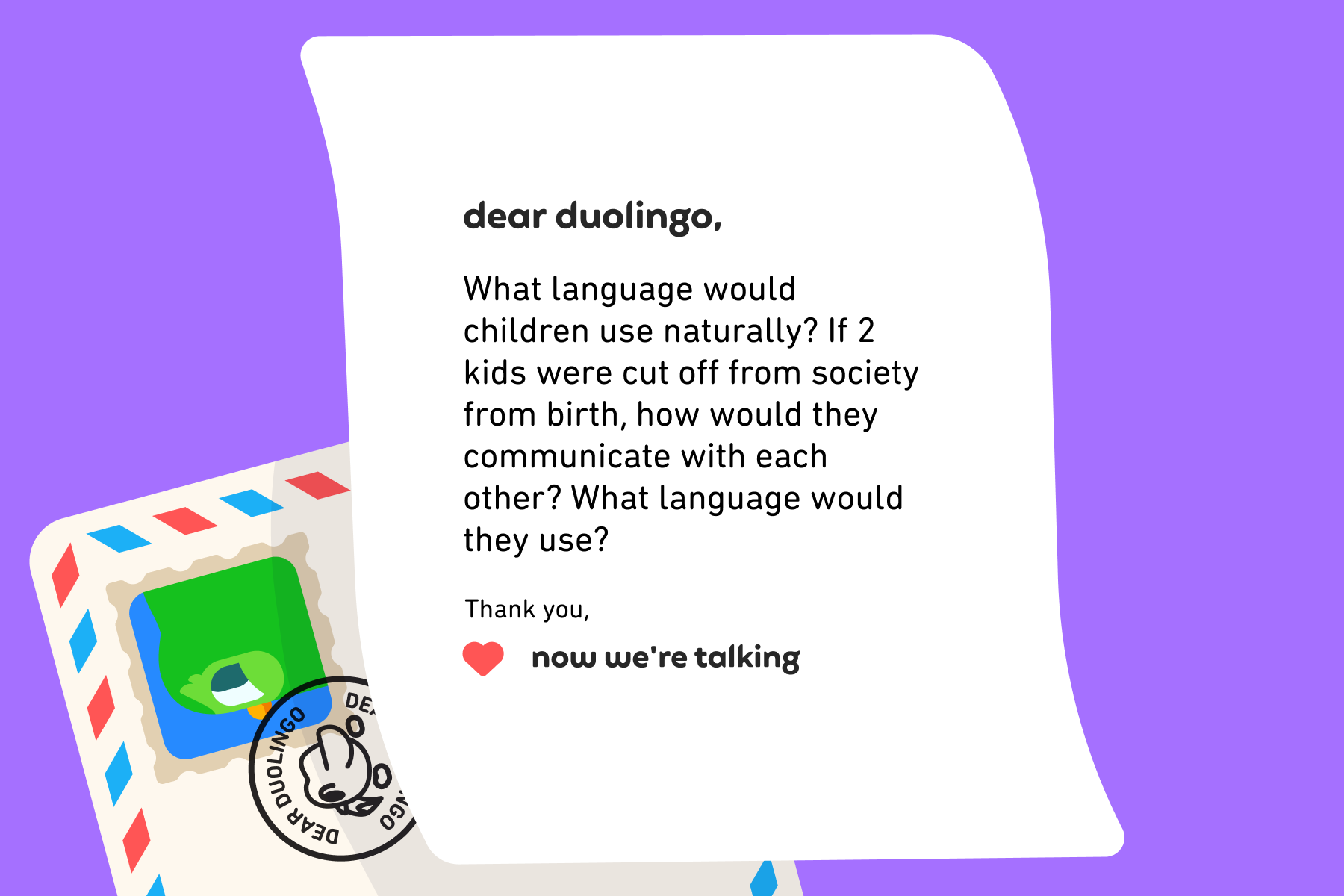Welcome to another week of Dear Duolingo, an advice column just for learners. Catch up on past installments here.
Hey, everyone! This week's reader-submitted question is philosophical and applicable to many important issues in language learning—too many, in fact, to do them justice in one post. (Let us know which of these topics you want to learn more about!) Here's the question:
Our question this week:

This question is more complex and interesting than you may realize! In centuries past, some people would answer this question with a specific language (Latin! Hebrew! Ancient Greek!), but that was to defend the "oldness" or "originalness" of a language. The short answer is that if 2 kids grew up together, away from all other influences, they would make up a totally new, never-before-heard language. 😍
Although there’s a lot of research that leads us to believe this, it's never been truly tested—and never should be. Intentionally depriving kids of normal socialization, family, and language is horrible—in fact, it's been called "The Forbidden Experiment" among psychologists and linguists. But why would this question even come up?
"The Forbidden Experiment"
The reason that Now We're Talking's question has intrigued researchers is because of the critical period hypothesis. This hypothesis asks whether there is an "expiration date" in our brains for learning some things, like a language. Researchers have wondered whether a critical period exists at all—and if it does, might there actually be multiple critical periods? (One cut-off for learning a second language versus your first language, one for learning vocabulary versus pronunciation, etc.) Also, what happens if you try to learn a language after the critical period?
For learning a second language, it's pretty easy to research and analyze the process: Lots of people of all ages study new languages! You can compare how well people learn at different ages, with different methods, and for different languages.
But it's very different to test what happens if people learn their first language at different ages. Most of us started learning our family's language from birth… but what if someone was never exposed to a language until they're older, like 2, or 7, or 13, or even 20? Can your brain always learn its first language, or do natural brain changes over childhood mean that at some point we lose the ability to learn even our first language?
While this can't be tested in true experiments (because they would be horrible and unethical), there are some natural situations that arise that give us information about critical periods and language learning. (Warning: Many of these accidental situations are upsetting, while others are exciting—I'm going to focus just on the language learning part of these cases to protect sensitive readers from the details.)
Feral children and a girl named Genie
One accidental situation that teaches us about the critical period for language learning is children who suffer isolation. In a few extreme cases, a child has had basically no interaction with other people or caregivers, usually due to neglect and abuse, and as a result they don't have exposure to language. These cases are exceptional in many ways, and importantly it's not like everything else in their lives is normal and the only thing missing is language—these "feral children" might grow up alone in the wild, or they've suffered abuse in any number of ways.
One case that received a lot of attention from psychologists was the case of a girl given the nickname Genie. She had been almost entirely isolated until she was 13 and so had never learned a language. Even after years of language therapy, her understanding of English and ability to pronounce words and form sentences never progressed past toddler level. It seemed that her brain had passed some developmental milestone (a critical period?) and was no longer able to truly learn a language.
Kids on the playground create a brand-new language
There are more hopeful scenarios, too, including one that better matches Now We're Talking's question: kids creating their own language, all on their own!
This case is about deaf kids in Nicaragua. All around the world, most deaf and hard of hearing children are born to hearing families, so they don't learn a sign language from birth—and in some places there isn't a standard or official sign language that the whole deaf community uses, either. This was the case in Nicaragua before the 1970s: Deaf Nicaraguans used systems of gestures with their hearing families, but they weren't full-fledged languages and each family had their own home sign system. Deaf people were sort of isolated from each other, until a new national school for the deaf was created. Suddenly, deaf kids from across the country were playing, studying, and working together… and they needed to communicate.
Those kids naturally and automatically created a brand-new sign language. It didn't happen overnight, but it was pretty close: From their varied home sign systems, the kids just improvised a language. Their brains were hungry for it! The first generation of kids at the school developed their own system, and each subsequent student cohort made it more systematic, more complex, more completely a language. 🤯
Their brains created new vocabulary, grammar rules, pronunciation (like hand shapes and placement), and conversation rules on the spot. No one needed to teach them, because their brains were ready for language. Those littler kids and later cohorts seemed to have not yet hit the learning deadline—their critical period hadn't passed. For more on Nicaraguan Sign Language, check out this episode of Radiolingo!
Language access
What these different scenarios teach us is the importance of language access. This phrase can mean different things depending on the context—for example, a city providing important emergency information only in one language but not in others is an issue of language access, and so is the question of children getting input in a language they can understand.
The issue of language access comes up a lot for the deaf community, not just in Nicaragua. Deaf and hard of hearing babies don't have full access to spoken language, even if they have some hearing: They can't physically perceive the nuances of words, they don't know that they are being spoken to if they are looking away, and they can't rely only on visuals (like lip reading) to learn language. Since most deaf babies are born to hearing parents, not all deaf babies get access to language right away.
As we know from Genie, the deaf Nicaraguan kids, and many other kinds of research, our brains are hungry for language—it's like our brains need to be programmed, and language gives us access to all the software we have up there. Delaying access to language has real consequences for language development, but also for other cognitive skills (like literacy outcomes, executive functioning, and inhibitory control). This is worth discussing more in another post—let us know if you're interested!
One thing is clear…
Your brain needs language, and it knows just what to do with it! Language is an important way that we interact with the world and it even affects other skills that we develop. It's like our brain's operating system!
For more answers to your language and learning questions, email us at dearduolingo@duolingo.com.



